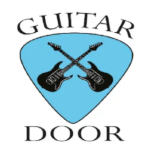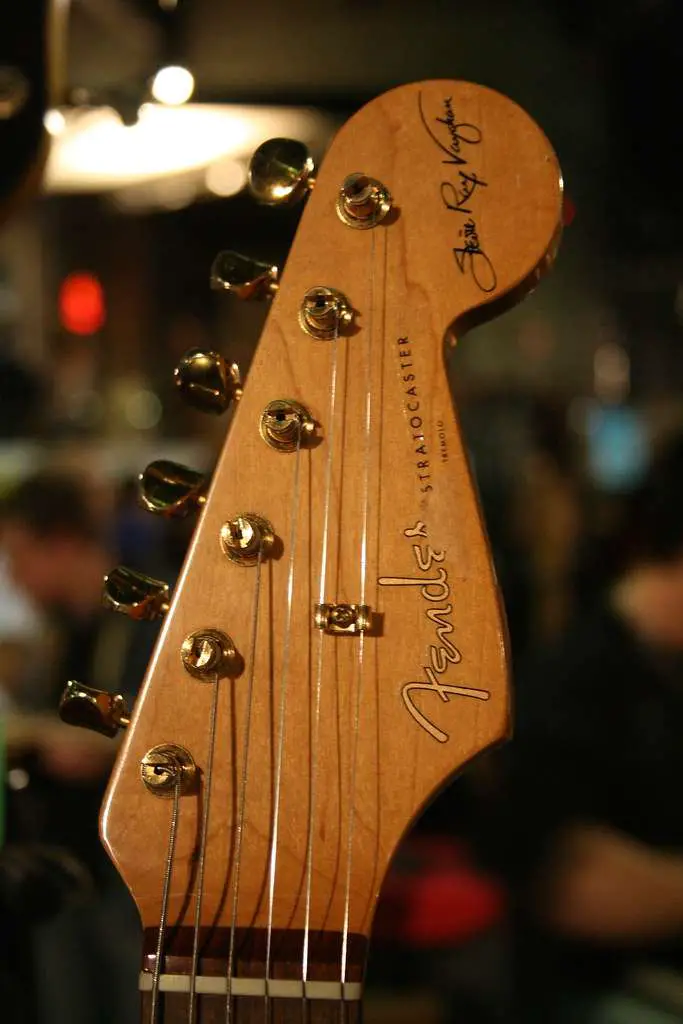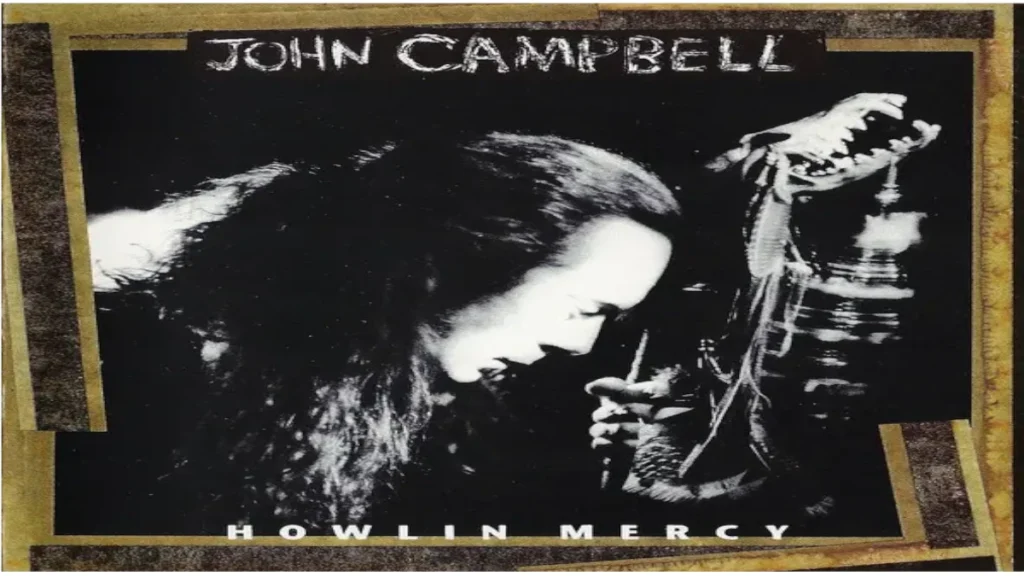The D-chord is a fundamental chord in rock guitar history. It is a versatile and powerful chord that has been used by countless rock guitarists throughout the years. Its distinctive sound and ease of playability make it a go-to chord for many rock musicians.
Cover Photo Credit”Exhibit at the National Museum of the American Indian in New York City honoring guitarist Link Wray (May 2, 1929 – November 5, 2005 (76)), best known for his 1958 instrumental hit ‘Rumble.’ Wray’s parents were Shawnee.” by John Wisniewski is licensed under CC BY-ND 2.0
One guitarist who had a massive influence on the usage of the D-chord in rock music was Link Wray. Wray was a pioneer of the power chord, a chord that consists of just two notes – the root and the fifth. He used the D-chord extensively in his music, creating a raw and aggressive sound that would go on to inspire generations of rock guitarists.
Wray’s innovative use of the D-chord helped shape the sound of rock music. His heavy, distorted guitar tone and aggressive playing style influenced countless guitarists, including legends like Jimi Hendrix and Pete Townshend. The D-chord became synonymous with the rebellious and energetic spirit of rock music, and its usage in rock guitar history owes much to Link Wray’s groundbreaking contributions.
The d chord in the tune “rumble” by Link Wray is a crucial element of the song’s unique sound. It is played with a distinctive twang that adds depth and character to the melody. This chord has been widely recognized as one of the most iconic in rock and roll history, and it continues to inspire musicians to this day. Overall, I believe that the d chord in “rumble” is a testament to the power of simple yet effective musical techniques.
Wray is widely regarded as one of the pioneers of rock music. Born in North Carolina in 1929, Wray began playing guitar at a young age and developed a unique style that incorporated elements of blues, country, and rockabilly. In 1958, he recorded the instrumental track “Rumble,” which featured a distorted guitar sound and a driving rhythm that would become a hallmark of rock music. “Rumble” was banned from several radio stations due to its perceived association with gang violence, but it still managed to become a hit and influenced countless musicians in the years to come. Wray continued to record and perform throughout his career, earning a reputation as a master of the guitar and a true innovator in the world of rock music.
The Guitarist who played the Most important D-Chord in rock History
If you were to place the sound of a Link Wray power chord, especially the D-Chord in Rumble of Rock you got the beginnings of Rock Guitar History by talking about the guitarist who created the sound we now know as Modern Rock Guitar. He played the Most important D Chord in history, because when you hear the simple but effective power chord progression D D E…you just hear Link Wray’s intro to “Rumble” which launched a thousand bands and went on to influence many great guitarists the original rock and roll rebel.
Power Chords, Fuzzy Amps Banned Instrumentals and Playing Live Till His Death
The D-Chord in Rumble and the introduction of power chords into music with the Fuzz of a broken amp speaker, helped along by Link by taking the pencil and stabbing the speaker with more holes to make it louder. This laid the foundation for everyone thereafter in the creation of the first rock and roll songs with an introduction to distortion for the masses.
1958 brought Rumble and a handful of other instrumentals that ultimately sold a million singles and “Rumble”s menacing sound actually brought it to be the first instrumental to ever be Banned from radio for fear of inciting the violence of films like “Westside Story”. These times he was also one of the first to use the Vibrato on his amp to full effect, opening another sonic innovation. Link Wray performed live right up to his death in 2005 and I was lucky enough to see him and interact twice in a matter of 2 years.
You really didn’t meet Link Wray, as when he stepped on the stage it was more like encountering a Tiger, even in his 70’s he was quick with a smile or if you disrespected him you should have known better as you might have been introduced to a Switch Blade, this was confirmed by a drummer I spoke within the year 2000 who was on the road with Link.
Sonically in his early days, he would use many Danelectro guitars, and as years passed he would use the original second Version of a Gibson Les Paul which was later renamed the Gibson SG. He eventually acquired a 60’s Yamaha SG2 which was modified into his Beloved “Screaming Red” guitar complete with an Indian chief’s Headdress painted on the Pickguard.
He in later years would turn the speaker Cabinet for his Marshall half-stack backward away from the audience. Why? Well in true Rock N Roll Fashion it was turned up as loud as it could go and shook the walls.
By 2002 he retired “Red ” from the road and played a couple of Fender Stratocasters.
Link Wray never rested and got complacent, he didn’t just go out and execute the classic catalog of songs. His last few albums including “Shadowman” and “Barbed Wire” were as important as any work he did. Let’s face it head-on. He changed the course of the Modern guitar. He stood tall as an innovator like Edison’s electric lighting. For reasons unclear, he’s only posthumously been nominated for inclusion and quickly NOT inducted into the Rock n Roll Hall of fame. An institution I would personally dare say he Built hands down by influencing everyone who ever heard him with that D-Chord in Rumble.
and Jimmy Page in the film “It Might Get Loud” is speaking the Truth of Link Wray.
Many others included in the film “Rumble..The Indians who Rocked the world” sing his praises. Pete Townsend has gone as far as to say had there been no Link he probably would have never picked up the guitar. I found him a Gentleman, a force of nature, and a True Living Legend and he’s meant the world to me personally. I have reached out and been in touch with his Daughter and Joe Chambers in Nashville who is CEO of the Musician’s Hall of fame. Joe is another fine Man and has been receptive to the idea. So if you wish to join the effort please approach Joe Chambers with respect. It is unclear to me what it will take to Get Link to the Rock Hall of fame in Cleveland, but I know there are thousands of us who are not giving up.
Wray was the Key Innovator of modern rock music
The Electric guitar in the Hands of Link Wray was a weapon of Joyous anarchy and Rebellion, and a tool of Creativity. He altered my life in a significant personal way…and if you play an electric guitar he has altered yours whether you know it or not. He is the Cornerstone of the building. He is the, as a naked Keith Moon screamed as he hugged Link and spun around in circles. “THEE RUMBLE MAN!”
Remembering Link Wray NPR Documentary
Brass Ring of the Rock Hall for Link Wray
Link Wray, the American rock and roll guitarist, is not in the Rock and Roll Hall of Fame despite his significant contributions to the genre. Wray’s innovative use of distortion and feedback on his guitar, particularly on his hit song “Rumble,” influenced countless musicians and helped shape the sound of rock and roll. Despite this, Wray has been overlooked by the Hall of Fame, leading many fans and music critics to question the choice process and criteria used by the institution. This is an article I wrote about link Wray and why he should be inducted to the rock hall of fame on another website. If you would like to read more about Wray and the D-Chord in Rock History but in the meantime why not give us your thoughts on Link Wrays music here in the comments. If you are a musician why not check out these websites for musicians to share music or share your music with us in a guitardoor interview.



